#Richard Hanania
Text

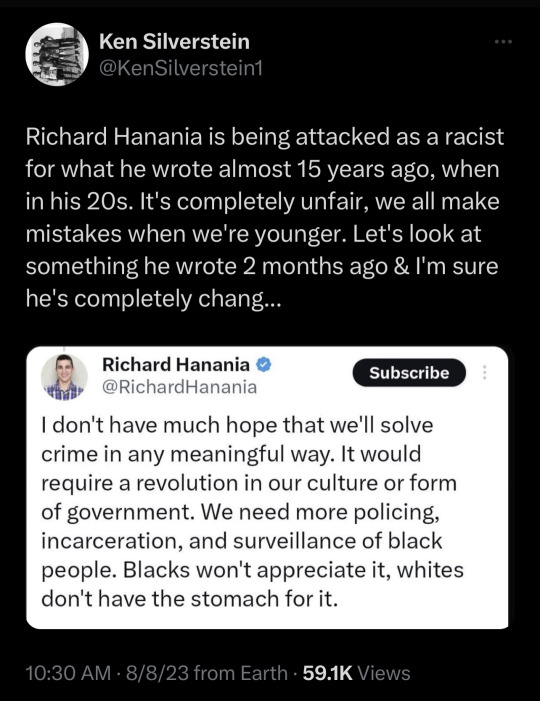
I was stunned to find the number of people in the tech industry who are all-in on the theory of scientific racism and eugenics. They've been out about that for years, though.
There's a sort of complex where this was the birth of, whether you want to call it the intellectual dark web, I think that was the moment there. They've sort of been radicalized gradually, as happens with these things, where they started with, like, Slate Star Codex was a really big key central point for them to gather and sort of say, well, we have to interrogate and question a lot of these (egalitarian) assumptions. They were very actively courted by the neo-reactionary movement.
So you have things like Peter Teal holding dinner parties with the founders of the movement, and sort of people who have explicitly endorsed slavery, explicitly endorsed disenfranchising women, and people of any non-male gender from being able to vote.
And I always resent it because I sound like a crazy person by just merely accurately describing what they have publicly said. I sound like a conspiracy theorist who's pinning up red strings on a cork board by literally being like, “This is a thing they said out loud, in public, multiple times.” And people are like, “There's no way.” And I'm like, I don't know what to tell you, but it's all out there. We have receipts for ten years.
They are way out there, and they have an explicit agenda of normalizing, really radical, really hateful agendas.
And for me, it's like, it's just a very simple thing.
It's like I have to care about my kid’s safety. I have to care about my friend's safety, I have to care about, you know, basic moral values that we used to agree on.
And that's the other thing too, is because I knew these people 10 and 20 years ago. Like the first blog that Marc Andreessen ever had, I set up. It was on a platform I helped build. So I know that there was a point in which, at least from the public visible face, this was once a reasonable person. And for them to embrace the sheer intellectual dishonesty, along with the hatred… the fact that they're just like, they don't care that they're lying because it's an effective tool to get what they want.
That stuff is… I don't know.
It really soured me on the traditional tech industry.
This is what their tech is for. The things they fund are meant to carry out their agenda.
Let me give you a clear example: To the people who believe in this extremist racist ideology, Elon Musk being willing to lose tens of billions of dollars in value of his own money, presumably, in Twitter, turning into “X,” is a principled person who puts his values ahead of the dollar. He is so committed to advancing this reactionary movement that he's willing to forego tens of billions of dollars of personal wealth in order to advance it.
And what rational people see as the destruction of Twitter is rather, the destruction of the ability for anybody to ever again make a Black Lives Matter hashtag, or to make a Me Too hashtag. And that is because he's not a dumb person. Like the thing that a lot of progressives and reasonable people want to just say, well, he's racist and evil, so he must be dumb.
He's not a dumb person.
Peter Thiel's not a dumb person.
So if we assume they're smart people who understand how systems work and have virtually unlimited resources, then why would they choose to do this?
Well, there must be a reason.
And there is a reason.
It's just one we don't like to confront.
Even more insidious is the fact that these tech moguls own huge companies with enormous influence, and wielding that kind of power over their employees creates a herd mentality within their workforces.
So if, for example, Facebook's board includes both Peter Thiel and Mark Andreessen. They don't have to give somebody an order to say what kind of content they want to promote on the newsfeed, on Facebook.
Everybody who works there knows this is who our bosses are. This is what we got to do, because they're smart. Everybody's smart, everybody's very reasonable.
And so you don't have to imagine, like I said, I don't have to be a conspiracy theorist that's putting up some red strings on a cork board to connect the dots and whatever. You're like, “Oh, I'm a midlevel product manager at a company. I'd like to make a name for myself and make the share price go up. And I know the boss's boss has been on every podcast in the world saying we need to promote more voices that are calling for ethnic cleansing,” okay?
Message received.
That's what a person who has no moral context would do. And there are a cohort of people in the technology industry that have come up entirely consuming media owned and created by these people, because they know the programming site Hacker News, which is owned by a venture capital firm and run by Paul Graham, is one of these guys.
They read blogs written explicitly by these guys. They consume it. They were on clubhouse. They're in a Discord chat with others that are sort of buying the stuff. They have a full wraparound media bubble. If they just read substacks and listen to the blog posts or read the blog posts from these folks, you can have what feels like an entire media diet shaped solely by this dialogue.
And this is why they're trying to own the media outlets and the distribution, like Twitter, alongside owning the platforms. And the fact that they can control more parts of society, right? The leverage of owning the distribution networks, the leverage of owning media outlets, the leverage of owning the platforms is very, very different, because we do have a lot of historical precedent.
If we go back 100 years ago and we say you're reeling from coming out of a pandemic, you are reeling from economic precarity and inequality at unprecedented levels, and you see the rise of, again, a direct parallel, virulent antisemitism. And you have things like the oil barons giving way to the Henry Fords of the world, the labor crackdown of the Pinkertons, Ford's embrace of, you know, to the point where he's pen pals with Hitler, and IBM building the technology.
The first person that ever asked me to do technology work for him was a neighbor of ours, and he had a tattoo on his wrist. And I was a little kid and didn't know what it meant. And I asked him what it was. It was his concentration camp tatoo. And what people don't realize is those are database entries in an IBM database.
And IBM's stance at the time was that they were neutral.
This is what technology does to enable the rise of fascism and victimization around the world. And we have a direct precedent less than 100 years ago, of how these technologies are used.
And I don't say that lightly.
I'm not saying we're there yet, but that is how you get there. And I would be surprised if the pattern doesn't play out in some ways, in terms of if you have tycoons of industry at a moment when the world is reckoning with massive social change, cultural change, along with recovering from things like economic destruction, inequality and pandemics… And you have rising military threats around the world.
That is exactly where we were a century ago.
—ANIL DASH shares his thoughts and experiences on Richard Hanania and rampant neo-fascism in Silicon Valley
#anil dash#richard hanania#peter thiel#elon musk#silicon valley#eugenics#fascism#twitter#white supremacy#antisemitism#racism#anti blackness#misogyny#transphobia#homophobia#conservatism#libertarianism#libertarians
149 notes
·
View notes
Text
Richard Hanania is still bugging me.
He is a right-wing intellectual who recently wrote a book called "The Origins of Woke: Civil Rights Law, Corporate America, and the Triumph of Identity Politics".
The Amazon blurb says,
"For those angry about wokeness and what it has done to American institutions, this book offers concrete suggestions regarding policies that can move us back to being a country that emphasizes merit, individual liberty, and color-blind governance."
Anyway, in August of 2023, the Huffington Post broke the story that in the teens, he wrote online under the pen name "Richard Host"
Richard Hanania, a visiting scholar at the University of Texas, used the pen name “Richard Hoste” in the early 2010s to write articles where he identified himself as a “race realist.” He expressed support for eugenics and the forced sterilization of “low IQ” people, who he argued were most often Black. He opposed “miscegenation” and “race-mixing.” And once, while arguing that Black people cannot govern themselves, he cited the neo-Nazi author of “The Turner Diaries,” the infamous novel that celebrates a future race war.
Hanania has admitted that the Huffpost story is correct.
Even five years ago, the media could set the narrative, tell people what was important, and how they should react to any particular story. We appear to be moving past the worst of the cancellation trend. Most outside of a certain echo chamber realize this kind of reporting is contemptible. The goal is not to engage with ideas, but to simply silence a person and remove them from polite company. To not have to discuss their ideas on account of other ideas they put forward at a different time of their life and which they may no longer even believe in.
Man, good thing cancel culture has been rejected, so that saying,
“We’ve known for a while through neuroscience and cross-adoption studies... that individuals differ in their inherent capabilities. The races do, too, with whites and Asians on the top and blacks at the bottom,” Hoste wrote in the 2010 essay, titled “Why An Alternative Right Is Necessary.”
“If the races are equal,” Hoste wrote, “why do whites always end up near the top and blacks at the bottom, everywhere and always?”
Is absolutely no obstacle to becoming a respected scholar of civil rights.
Wait a second... I'm not sure we've landed at the correct equilibrium.
Hanania is not a guy who makes TikTok videos about fancy cakes but said some unrelated objectionable things 15 years ago.
He is an author and the founder of a right-wing think tank who hopes to, and probably does, have significant influence on the direction of conservative ideas about civil rights law. His views on civil rights are directly related to his job.
Especially if, like, he was just actively lying to people about how he came to his conclusions as recently as may of this year
Here's an excerpt from a speech Hanania gave to the Yale Federalist Society on April 3 of 2023:
I’m glad to be here talking about woke institutions and civil rights law. I have to say, I was ahead of the curve on this issue. It’s something I’ve been thinking about since I was in law school. I graduated from the University of Chicago in 2013, and my 1L summer I worked for an organization called the Center for Individual Rights, which argued the Gratz and Grutter cases.
And I learned a lot while working there about how government forces institutions to be conscious of race and sex. So, for the last decade, from 2011 on, as I was doing other things in life, I would talk to people about all these things government did to discriminate against whites and men, remove standards, get rid of standardized tests, etc. And one reason I was so passionate about this is that a lot of the fixes did not require legislation. Executive orders and judicial decisions are enough. But the Trump administration came and went, the Supreme Court got more conservative, and still nobody was listening to me.
So finally I started writing on this topic myself, and now that I’m writing for the public instead of just trying to convince people one-on-one, I’m getting a better return on my efforts. Another reason what I’ve been arguing has caught on is that we saw the transformation in how institutions talk about race- and sex-related issues over the last decade. A lot of people are looking for answers. Who are these diversity bureaucrats saying all these crazy things? How did we end up with so many of them and where did they come from? And all this stuff that was more latent, of interest to legal nerds only in 2011, became much more part of the culture.
In 2010 Hanania wrote:
“The biggest enemies of the Black Man are not Klansmen or multinational corporations, but the liberals who have prevented an honest appraisal of his abilities and filled his head with myths about equality and national autarky,”
I'm not just trying to gratuitously point out how awful the things Hanania said were:
I am pointing out that he just lied, blatantly, about the very field he is supposed to be an expert in.
And that's not something that happened years ago when he was just a law student, that's something he did this year.
Hanania knows that this stuff was not "latent, of interest only to legal nerds" back in 2011, because by then he had already spent years embedded in a subculture that was deeply concerned about this kind of thing. Nor, for that matter, was he simply, "trying to convince people one-on-one". He was writing under a pseudonym for numerous far-right websites.
And honestly, at this point the question is just "How much of this speech is a lie" but if less of it is a lie, than it looks way worse for Hanania.
When he joined the Center for Individual Rights he wasn't 15 years out from writing all that racist stuff, he was 3 years out. How much of it did he still believe? When he was an active racist back in law school, was he still planning on joining the Center for Individual Rights?
If the answer is yes, and the actions of a blatant racist and the "classical liberal" he has now become are essentially identical, then, uh, I'm sorry, but that seems like the kind of thing that might be a pretty important part of the story of wokeness.
If the answer is "No" then, well, we're still left with the fact that he just blatantly lied about how and why he reached his current conclusions. This story of someone who had a vague, wonkish interest in something obscure but just had to speak up when he realized it was getting out of control in the teens is an utter lie.
This is a man who has told very self-serving lies about how and why he has reached the conclusions that he has, lies that are designed to leave out crucial parts of any honest appraisal of wokeness, and who kept telling those lies until he was unable to get away with it, up to this year.
I think his willingness to lie about his own supposed field of expertise in order to sell books is pretty damning in itself, and that didn't happen 15 years ago, that happened this year.
28 notes
·
View notes
Text
24 notes
·
View notes
Text
By: Richard Hanania
Published: May 14, 2023
The topic of black crime has taken over Twitter. It all started when Elon Musk responded sympathetically to a Tweet that presented data showing black-on-white crime is the most common form of interracial violence. The original tweet was completely correct, and you can see Noah Carl for some of the sophistry that has been used to try to deny or obfuscate on the underlying facts.
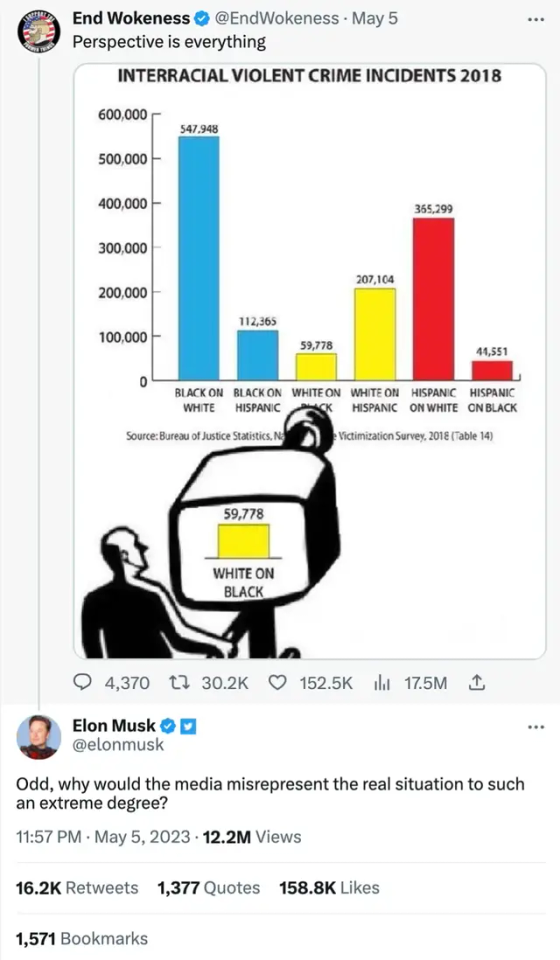
I personally don’t have the patience for taking part in these kinds of arguments, at least in the way that Noah is engaging here. It’s like the people who spend all their time arguing with trans and feminists by pointing to *scientific studies* showing that boys have penises and girls have vaginas. Men have more grip strength. Scientists just proved it! I guess someone has to do it, and I’ve run into some actual human beings (on the internet anyway) who tell me that they accepted the blank slate view of sex until they looked at the data. This makes me sad. But since the data does convince some people, I guess I’m glad someone is providing it.
Race and crime is similar. The numbers are there if you need them. I suppose foreigners might. But I grew up just outside of Chicago, and data on black criminality is to me just as unnecessary as sex comparisons of grip strength. Chicago is about a third black. Like many midwestern cities, it is extremely violent, with nearly all of the crime concentrated in black neighborhoods. When crime does spill over into the nicer areas, it’s committed by the people from those neighborhoods.
I knew many family friends who were Middle Eastern immigrants and store owners in the city. Every now and then, some distant relation or acquaintance would get their store looted or, in at least one instance I remember, shot and killed. Michael Jordan’s greatness was much appreciated and respected but its consequences used to fill the community with fear, because another championship tended to create another possibility that stores would go up in flames. The Arabs would speak in shorthand. “What happened to Walid’s store?” “You know, the blacks…” “Ah.” Actually, they would say “the slaves,” if you want to really know how Arabs talk.
Here’s the thing: while only immigrants and white proles explicitly discuss this aspect of their reality, every single person within the orbit of the city behaves as if they know the truth. No matter who you are, unless you’re one of the residents of those communities, your life is organized around avoiding the pathologies of the inner city. If you’re a desperate immigrant, you might open up a store, put up a “We Take EBT” sign, and take the risk of being shot. White Americans are less inclined to do this, so they instead just flee black neighborhoods and do what they can to get their kids out of black schools. They’ll make any commute or pay whatever tuition is necessary. No one is confused about this — liberals are correct that entire swaths of a major city don’t end up with zero white people by accident. They just attribute this to “racism” rather than the desire not to be sexually assaulted or physically harmed.
I’ve been talking about Chicago, but the same things are true for Milwaukee, Detroit, St. Louis, Cleveland, Baltimore, and countless other major cities. It’s also true for the cities where American elites and policymakers live like Washington, DC, which is why I’m always amused by theories that say they are actually acting in their own interests by coddling criminals. Other than blacks themselves, no group would benefit more from solving our crime problem than wealthy urban whites.
We can therefore ignore those who deny the reality of black crime. They’re either too stupid or dishonest to engage with. Among others on the left, there has been an acceptance of reality combined with pleas to simply frame the issue differently.
When liberals talk about perspective here, what they usually mean is that the likelihood of a white person being victimized by a black person is small in an absolute sense, so why worry about it? It would be a fine argument, except that we are constantly told to obsess over the harms done by police shootings, white supremacist violence, and vigilantes falsely accusing innocent black men of crimes.
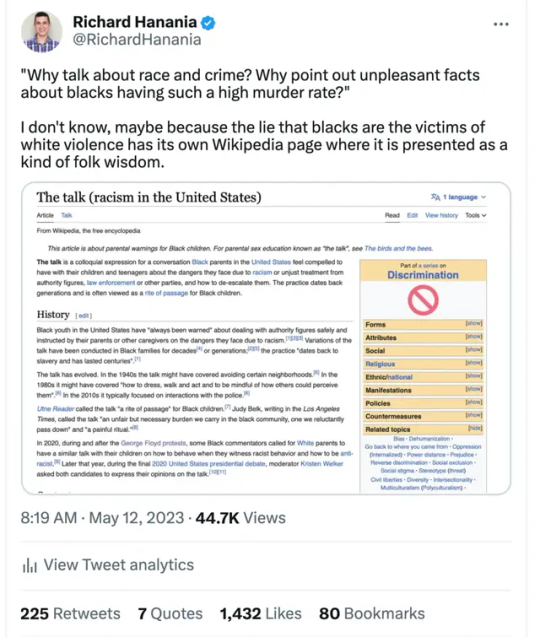
I thought about showing you NYT and CNN headlines implying that blacks have to live in constant fear due to racism. But you’ve probably seen them, and instead I’ll share this clip showing how the topic was addressed a few years ago on a major network TV show.
youtube
As a digression, I would recommend checking out a few episodes of A Million Little Things if you want to see the horror that is the PC therapeutic slop that normies are being fed these days, but that’s a discussion for a different time.
So the crime debate has been going something like this.
Conservatives: Look at all the black-on-white crime.
Liberals: Get some perspective man. It’s nothing compared to the chances of being murdered by your own race. Not to mention heart attacks or covid. These are very small numbers.
Conservatives: You guys are the ones telling us blacks are living in constant fear. Stop doing that.
Now, when having these debates, what’s frustrating is that people are usually talking past one another. There’s not like one guy named “conservatives” and one guy named “liberals.” The liberals who are telling you to have some perspective on black crime often aren’t the same ones pushing the narrative that blacks should live in fear of whites. It’s easy to “own” the other side by putting together views of different people and finding contradictions.
That being said, the myth of substantial white-on-black violence is so deeply embedded in the culture that it’s a storyline in network TV shows. I think it’s fair to ask people to take a position on it. If you dislike racists on Twitter focusing too much on black-on-white crime, know that they are closer to the truth than the race obsessives on the other side, and have a lot less power.
One odd thing about these calls for perspective is that when liberals say that intra-racial crime is more common than crime that crosses group boundaries, what they are essentially saying is don’t worry about black crime, because the victims are overwhelmingly black people. But wait! Since when are liberals uninterested in problems that disproportionately affect blacks? These are the people who write serious NYT think pieces about how national parks are too white. They now turn around and say, let’s not talk too much about murder, because blacks are the victims? It’s a very odd thing, and it’s hard for me to even steelman their lack of interest in solving this issue as they obsess over every other black grievance, real or imagined.
Some years ago I noticed that fact checkers started providing “perspective” on claims rather than simply saying whether they were true or false. Of course, what perspective to take on facts is a huge part of what political discourse is about. Do blacks commit a lot of violence against whites? Compared to the number of cancer deaths, no. But in the context of a comparison to white-on-black violence, absolutely. One can conduct a similar analysis of issues like covid, terrorism, and school shootings.
For me, I like cost-benefit analysis as the way to understand what problems are worth worrying about and what we should be doing about them.
Black-on-white violence is not the biggest issue in the world, but it is useful to talk about in order to challenge narratives that pose much more serious problems. Arguments about supposed racism committed by whites against blacks are why we can’t effectively fight crime in this country and why we can’t have freedom of association or meritocratic criteria in hiring. The belief in white racism as a major factor in American life is the force that distorts all of policymaking and culture. Any arguments that are effective at discrediting that narrative are worth making.
And no, I don’t consider acting on statistical realities to be a kind of racism society should solve. Once you remove reactions that are based on group behavior, and private preferences that are none of the government’s business in a free society, the remaining “racism” in the United States against blacks is negligible, and more than balanced out by the ways in which they are advantaged.
The truth of the matter is we have a disgraceful amount of crime in the US, and the costs are not simply a matter of the number of people robbed, raped, and killed. It’s also a tragedy that what could be some of the most valuable urban real estate in the country is basically uninhabitable. In fact, part of the reason that black-on-white violence is rare in this country is because whites have overwhelmingly fled places where blacks live due to the threat of violence.
Other pathologies of American life, like NIMBYism, which drives up the cost of housing, are also downstream of the crime issue. If you’re a resident of Tokyo, you don’t need to worry about greater density leading to a decline in public safety, the way that Americans have to.
There’s no “perspective” one can take from which a reasonable observer won’t find that inner city crime is a major problem, and something we should do our best to solve. The chart below shows the ten American cities of at least 100,000 people that have the highest murder rates, and how they compare to the most violent countries in the world. The murder rates for cities come from CBS, while the country data comes from the World Bank.
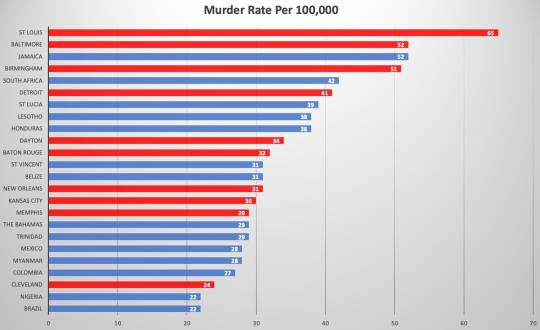
[ How the ten most violent US cities with a population over 100,000 compare to the most violent countries in the world. Red is US cities, blue is countries. ]
You might be saying that it’s unfair to compare cities to entire countries, since urban areas might have concentrated violence. Yet the most violent countries in the world tend to be small. For example, St Louis, which is number one in murder in the chart above, has 293,000 people. That’s a larger population than St Lucia (180,000) and St Vincent (104,000), which are shown on the graph. Detroit has 632,000 people, making it more than 50% larger than either the Bahamas (407,000) or Belize (400,000). New Orleans (384,000) and Cleveland (373,000) are close behind. So this isn’t a matter of cherry-picking areas with minuscule populations and making them look bad. These cities are the size of small countries, which means we are pretty much comparing apples-to-apples in many of these cases. And if you want to make a real apples-to-apples comparisons, try contrasting American cities to those in other first world countries, like London.
As I argue in my articles on El Salvador, any polity that has a high enough murder rate needs to make solving crime its number one priority. This was true for that nation before Bukele came along, as it is for major American cities today. It’s not a big mystery how to do this, it’s just politically difficult, because literally everything that works is considered racist. You need more cops, more prisons, and more use of DNA databases and facial recognition technology. You can’t have concerns about disparate impact in a world where crime is so overwhelmingly committed by one group. And yes, liberals are right about one thing, which is that gun laws matter too.
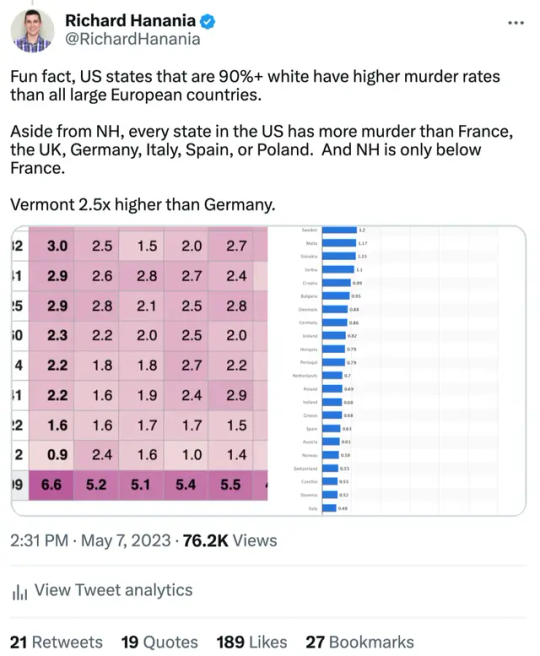
But the left is so out of its mind on everything touching on race that even though they’re right that gun laws matter, when it comes to actually enforcing them, they tend to shy away from doing so for the obvious reason.
While I support policies that can make incremental improvements, actually solving our crime problem to any serious extent would take a revolution in our culture or system of government. Whether you want to focus on guns or the criminals themselves, it would involve heavily policing, surveilling, and incarcerating more black people. If any part of you is uncomfortable with policies that have an extreme disparate impact, you don’t have the stomach for what it would take. And, unlike some, I’m not naive enough to think that non-criminal blacks would end up grateful towards those who took the steps necessary to make their communities safer.
Dealing with the crime issue is complicated for reasons that go deep to the heart of the American psyche, which means there’s little hope that things will change any time soon. Until they do, we should continue to at the very least push back on the most malicious lies being told about race in America.
#Richard Hanania#interracial violence#interracial violent crime#violent crime#black violence#religion is a mental illness#Youtube
4 notes
·
View notes
Text
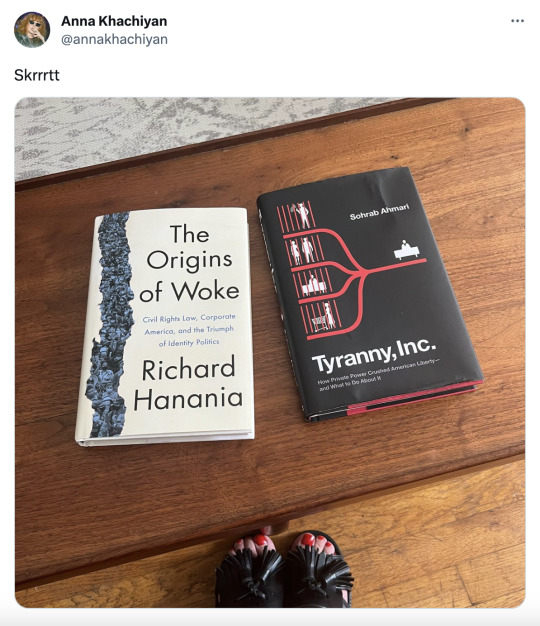
I guess they're about to learn this the hard way on Wikifeet, but the only thing worse than reading philosophy is reading contemporary popular political nonfiction. The past's popular political nonfiction, if it's ripened into a classic, is fine to read—often better than philosophy, in fact, hence my elevation of Emerson and Chesterton over the philosophers. But trying to sift through present-day material for the gems is too much of an opportunity cost. I had the patience for it when I was a kid but not now. I read so many of the Bush-era political books, for example, and what do I have to show for it? When's the last time you heard anybody deploy an insight gleaned from the once painfully au courant Verso volume, Afflicted Powers? Ironically, given how things turned out for all involved, the best of the W. books were probably Mark Crispin Miller's Frankfurt-School-inflected Bush Dyslexicon and Cruel and Unusual.
Anyway, I haven't done an ad on Tumblr in a while, and in another Xeet Anna K advocates "grandiose narcissism," so please let me renew my recommendation to Tumblr's apparently substantial Red Scare contingent of Portraits and Ashes, a novel I wrote in 2013, which foretold the whole Red Scare sensibility. In my later material, though, I have moved on thematically. (A paid subscription to my Substack gets you access to a post containing pdfs of my three prior novels, including Portraits and Ashes, as well as to my serialized novel-in-progress, the occult-themed American epic, Major Arcana.) I wrote my last Red-Scare-ish story, "Sweet Angry God," in 2015, three years before the pod debuted. You can read that story for free here. The opening paragraphs:
Apparently it began with a hate fuck. There was a dirtball café, no doubt collectively owned, a few blocks from the art school. He worked there, and she had been watching him for some months, maybe even her entire sophomore year. The first time she went into the place she noticed him, how hateful and stupid he was. Some kind of percussion-heavy music rumbled over the speakers, hissing with analogue static. She thought she felt the tuba thrum in her throat. Above the music she heard him talk to his co-worker as his face glistened in the espresso machine steam. He didn’t look at her, not even when his dirty fingernails grazed her palm with the change.
“No, Romanian. It was a group, yeah, I mean they allied with Hitler. Not saying I’m defending them, but, I mean. They were pissed off that their culture was being violated by the modern west. Yeah, they hacked people’s heads off. Limbs. Like werewolves, man. Okay, it’s fucked up. But today you just push a button. Is that better? This is their marching music.”
She kept her eye on him after that. Maybe he was dangerous. She would look over her laptop screen when he came out from behind the counter to wipe down the tables. He stomped around in careless bursts, like a toddler. He had a pervert’s goatee and wore bowling shirts stained at the armpits. When she saw his sneakers, so old they’d become fashionable again, she understood what “down-at-heel” literally meant. His body looked sinewy, a bad cut of meat. Stupid-ass white boy. Sometimes she checked certain books out of the library to read in front of him, anything by or about men ready for violence. Marinetti, Mao, Fanon, whatever. His eyes were always elsewhere. Men ready for violence unmade and remade the world. She just lived in it. She wondered if he didn’t want to just live in it.
Her sophomore-year final project she called Men Ready for Violence. Blood-spatter paintings were arrayed around a screen showing various armies on the march. Their choreography contrasted with the chaos of the red paint. She loaded the artist’s statement with jargon, quotations from Klaus Theweleit and Judith Butler, so that her teachers didn’t call a shrink or a cop. Everyone was polite about it, one professor even enthusiastic. Her classmates looked at her strangely. Especially the girls.
Then the semester was over. One week left before she had to come home to mamá. She sat in the café reading Ernst Jünger. He wiped down her table while she was still sitting at it, his face vacantly smiling, the dirt-nailed knob-boned fingers sinking in the washcloth’s soft folds. One week. What would a Romanian fascist do? She reached out and grabbed his wrist hard. Her face must have looked like it couldn’t believe what her hand had done. Her nails were red-stained with oil paint. He was looking at her nails and then turned to look into her eyes. He showed smoker’s teeth.
How did I know in 2015 that this type of young woman, then still immersed in pop Jezebel-style feminism, would soon be getting into aesthetic fascism? Because I'm not a philosopher. I can't afford to let logical argument block the truth.
#anna khachiyan#red scare#creative writing#mark crispin miller#sohrab ahmari#richard hanania#nonfiction#literature
7 notes
·
View notes
Text
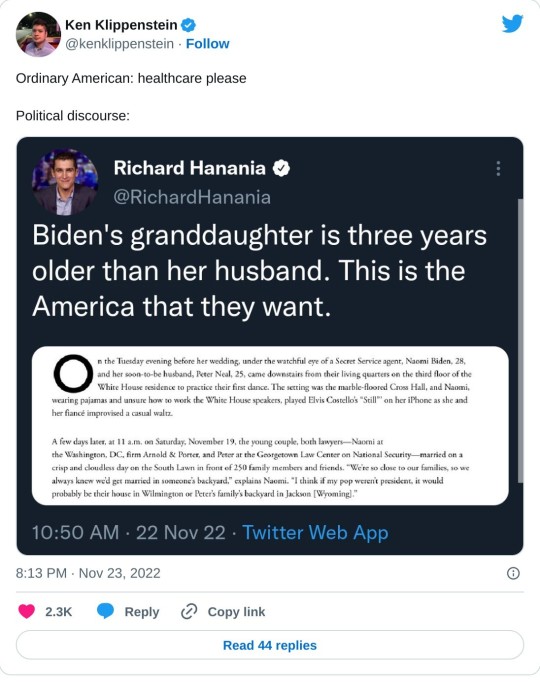
#us politics#2022#twitter#tweet#republicans#conservatives#bigots be like#republicans be like#conservatives be like#ken klippenstein#biden administration#president joe biden#Richard Hanania#naomi biden
44 notes
·
View notes
Text
In his recent links post, Scott Alexander linked to this very powerful and disturbing essay by Richard Hanania (content warning for devastating honesty but honesty about some potentially upsetting and arguably quite intolerant attitudes). I actually had run across it a few weeks ago and had it in mind when responding in a recent back-and-forth discussion about what stigma is, and forgot to bring it up and link to it (perhaps for the best; my responses were getting more and more unwieldy already). But here is a guy who has an "ugh, eww, I don't really want to be around that, I also have a vague idea that people like that are less trustworthy but can't entirely pinpoint why except eww" reaction to certain types of people. That seems to represent an instance of stigma at its purest. Maybe that still isn't a 100% pure "disvaluing" type of stigma attitude, and maybe that virtually doesn't exist, but it's pretty far along the spectrum in that direction.
That article will probably have a pretty lasting effect on the way I think about anti-woke-type-progressive people actually: I've always tended towards the assumption that SJ-type activists are too keen to imagine their opponents as coming from a place of irrational disgust, and SJ activists probably still are overestimating this, but it's very possible that more of the opposition is rooted in pure gut-level disgust than I have been recognizing.
60 notes
·
View notes
Photo

(link)
#richard hanania#twitter#screenshot#slate.com#world happiness report#finland#lies damned lies and statistics#trust the science
21 notes
·
View notes
Text
Los orígenes del movimiento woke
En su libro, Hanania se centra más en los mecanismos políticos y legales que en los fundamentos filosóficos del movimiento
Por David Román
Varios libros de calidad han sido publicados en fechas recientes explicando la curiosa evolución del movimiento woke que salió de EEUU a finales de los 2010s y ha infectado a todo occidente desde entonces. El mejor de los que he leído es The Origins of Woke,…

View On WordPress
#Autor David Román#Fundamentos filosóficos del movimiento#Ideas.Gaceta.es#Movimiento woke#origen#Richard Hanania#The Origins of Woke
0 notes
Text
elon musk is a nazi
peter thiel is a nazi
richard hanania is a nazi
tucker carlson is a nazi
jordan peterson is a nazi
all these guys are nazis
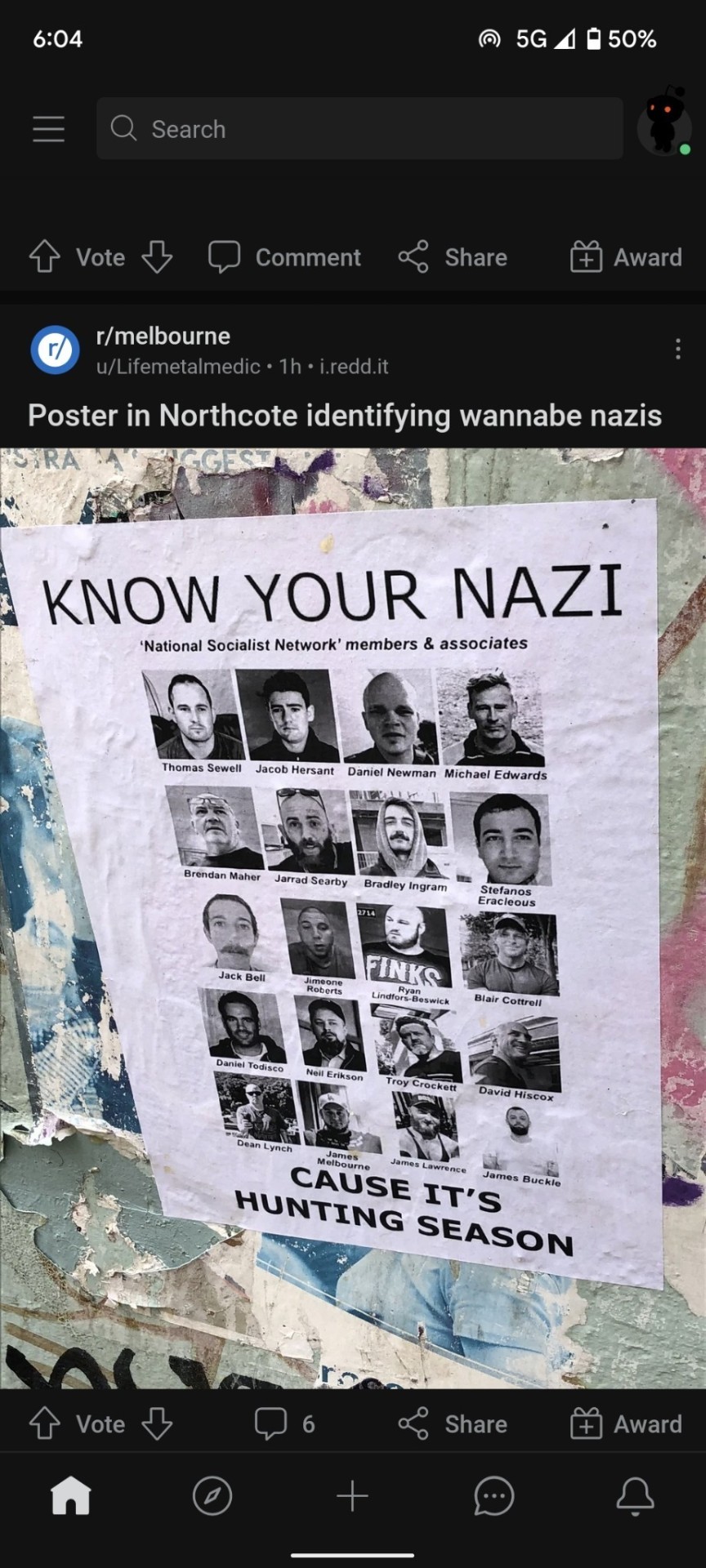



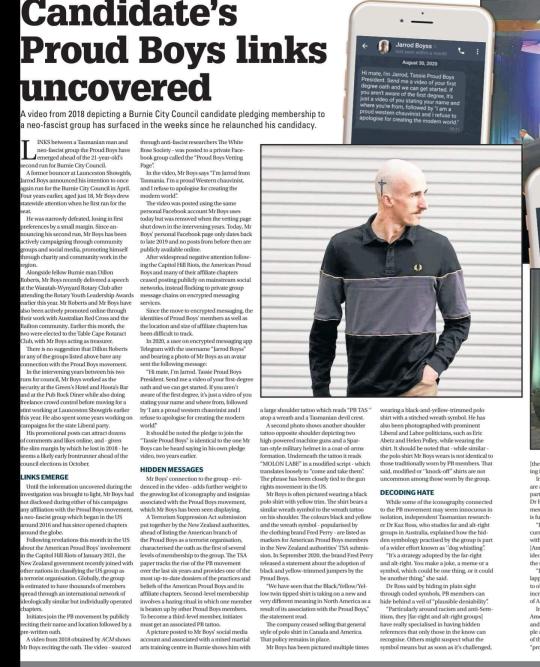

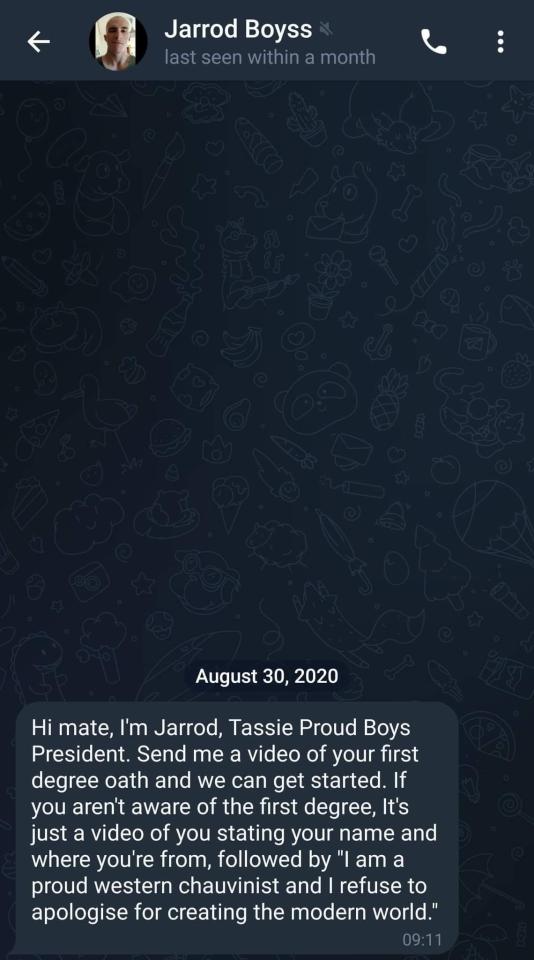



#elon musk#peter thiel#richard hanania#tuckercarlson#jordan peterson#nazisploitation#nazis#nazigate#nazi#neofascism#right wing extremism#civil rights#right wing terrorism#right wing politics#right wing women#right wing bullshit#rightwingers#far right#ausgov#politas#auspol#tasgov#taspol#australia#fuck neoliberals#neoliberal capitalism#anthony albanese#albanese government#neonazis#neonazi
1 note
·
View note
Text

This guy is an absolute asshole, an actual mistake of a human being, but he is just farming engagement on that awful site.
It makes one ponder the incentives of a system that makes that behavior successful.
0 notes
Text
I happen to agree with Yglesias that people who have reactionary beliefs and ideas can also make good points — but this does nothing to explain why we should listen to Richard Hanania in particular, who does not have good pieces and who does not make good points. I would be embarrassed to say this about him for the same reason that I would be embarrassed if someone snatched away my copy of The Financial Times and revealed that I was also reading The Very Hungry Caterpillar underneath. The man is an idiot! Being interested in what he has to say makes you an idiot, too! How do you not see this?
Part of the problem, again, is that guys like Yglesias are often blinded by even the most irrelevant credentials. Another, I suspect, is that nothing says “interesting” and “intelligent” to liberals like dark-money funding. As Jonathan Katz notes, Hanania has demonstrably been propped up by a big anonymous donor, and given his multiple Silicon Valley connections it’s not hard to guess where this is coming from. 1 Guys like Yglesias see the media exposure and promotion that dark money buys and just can’t help but decide that whoever’s on the receiving end must have done something to earn it.
Still, it’s hard to watch people like Drehr and Yglesias praise Hanania and not see something else at work. Drehr didn’t praise Hanania as “interesting” because he had to; like Yglesias, he did it to make a show of his ability to appreciate Hanania’s merits despite his bigotry. For liberals, this is really just a backhanded way of praising yourself.... Similarly, when Yglesias says that Hanania has “written some good pieces”, what you are really supposed to take away from this is that Yglesias is a powerfully clear-eyed and intellectually rigorous intellect who can even see past overt white supremacy and grasp Hanania’s true genius.
I posted this because I think Beijer made a worthwhile point or two about how liberals (but maybe really centrists) behave. But I am posting it on my "yucky human things" blog because Beijer's heavyhanded use of ableist language made it unsuitable for my main. I agree with him that the Nazi Hanania is egregious and that Matt Yglesias is a jerk, but Beijer also is kind of a jerk, so belongs on this blog.
#ableism tw#racism#Nazism#white supremacism#genocide#eugenics#eugenicism#misogyny#fascism#Richard Hanania#Peter Thiel#Rod Dreher#Matthew Yglesias#Matt Yglesias#Carl Beijer#liberals#liberalism#centrists#centrism
0 notes
Text



Shitty situation, but not surprised
0 notes
Note
If Richard Hanania survives this the vibe has well and truly shifted.
It makes the sense that the first established conservative figure to come out of the online white right isn't specifically about that
0 notes
Text
Why for the lust of little kittens would anyone create the acronym 'TESCREAL' when 'CLEAREST' is like right there?
#wordcelery#incidentally 'cosmism' is not a word#but that's really the least of the issues here#h/t richard hanania
0 notes
Text
Murderers have always angered me less than people who don’t want to execute them, with the worst being family members who call for those who killed their loved ones to get a second chance. To be evil is bad, but weakness is what is truly unforgivable.
Richard hanania is interesting for the way he suffers from a sort of normative inverted spectrum. What is good he perceives as evil, what is evil good, what is beautiful ugly, and what is nauseating sublime. All in precisely the same degree as the original, just with the sign flipped
121 notes
·
View notes